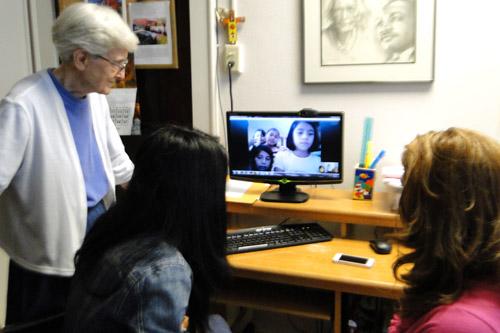
FORT SMITH — During their most recent mission trip in July, Partners in Benedictine Education, a ministry of St. Scholastica Monastery in Fort Smith, established an electronic bridge with their 21 scholarship students in Colegio San Benito in Esquipulas, Guatemala, and Hogar Esquipulas, the Franciscan orphanage where 10 of the students live.
The seven-member mission team, who had launched Campamento Escolastico, an English as a Second Language camp, as an enrichment program for the scholarship students, set up Skype connections at the school and the orphanage so that interactive learning and relationship building sessions could continue throughout the year. Skype allows people on both ends of an Internet connection to see and hear each other in real time.
Ramsey Junior High School teacher Maria Rosy Galvan, who visited Esquipulas in July, has led three one-hour interactive sessions with the children in the orphanage so far.
“The girls were getting ready for their final exams, and we reviewed their notes. I helped them with vocabulary by composing sentences that would show them how to use the words in context. With the younger children, we reviewed the different words they’d learned in camp —body parts, numbers, colors and basic conversation.”
Haymée Giuliani, a Trinity Junior High School Spanish teacher who visited Esquipulas with her husband and son Patrick in March, has led some afterschool sessions with her own students and the students at the Colegio.
“My students practice their Spanish and the Guatemalan students practice their English,” she said. “We even prayed the Our Father together — my students in Spanish and the Guatemalan students in English.”
Giuliani’s students socialize with the children on Skype for a few minutes, and then she stays after school mentoring and reinforcing what the Guatemalan students learned during the school day.
“I have quizzed them for their tests, and, using a small white board, reinforced the correct spelling of words. Skyping from the classroom gives the students there the feeling that they are in class.”
Two of Giuliani’s ninth-grade students, Barrett Weidman and Mydia Phan, have enjoyed meeting the Guatemalan students via Skype.
“The high school students there wanted to practice their English, and we had a chance to practice our Spanish,” Phan said. “Some of the older students knew English better than we knew Spanish.”
Both girls are relatively new Spanish students, having studied the language less than a year.
Gray Langston, an adjunct professor at University of Arkansas Fort Smith, and Judy Stetson, a web-based instructor at Carl Albert State College in Poteau, Okla., have also lent their expertise to the project. The two collaborated on an interactive storybook experience. Langston read the children’s book in English and Stetson used a split screen to show the picture book page by page as it was being read. Sisters Elise Forst, Kimberly Prohaska and Dolores Vincent Bauer, OSB, are getting ready to record their interactive story books with Stetson’s help next week.
Stetson’s knowledge of interactive learning is helping the Partners program develop new ways to interact with the scholarship students.
“Google Hangout and Skype have a cool screen-sharing option where I can “show and tell” interactive ESL games and exercises,” she said.
Each scholarship student has a prayer partner at the monastery, a sister who prays for the student each day and sends messages of encouragement. The electronic bridge has given the sisters a new way to build relationships with their prayer partners: sending video messages. Some sisters use a translator; others are studying Spanish with Giuliani once a week and composing Spanish messages to read aloud.
“I love being able to stay in touch with the children through Skype,” Galvan said, “because I am able to help them and let them know that we still care for them. When we visit we get so attached to the children and then we leave. Now we can see them on a weekly or monthly basis and continue to build our relationships.”
Please read our Comments Policy before posting.
Article comments powered by Disqus St. Theresa girls’ basketball: there’s no ‘i’ in ‘team’
St. Theresa girls’ basketball: there’s no ‘i’ in ‘team’
 Sister Stephanie Schroeder was lifelong learner
Sister Stephanie Schroeder was lifelong learner
 'What's going to happen?': 'Dreamers' in legal limbo
'What's going to happen?': 'Dreamers' in legal limbo
 Scholarships lead to nurses and lawyers for Guatemala
Scholarships lead to nurses and lawyers for Guatemala
 Parishes aid homeschool families with lessons
Parishes aid homeschool families with lessons
 Studio 3:16 offers new approach to teaching religion
Studio 3:16 offers new approach to teaching religion
 After three decades, NLR principal plans to retire
After three decades, NLR principal plans to retire
 CHS athlete overcomes odds to reach collegiate goal
CHS athlete overcomes odds to reach collegiate goal
 John Calipari: UA basketball coach and devout Catholic
John Calipari: UA basketball coach and devout Catholic
 'Cabrini' film tells story of saint with great faith
'Cabrini' film tells story of saint with great faith
 St. Joseph a model of solidarity with immigrants
St. Joseph a model of solidarity with immigrants
 Two gifts after Jesus’ death: Virgin Mary and Eucharist
Two gifts after Jesus’ death: Virgin Mary and Eucharist
 Why we have an altar, and not just a communion table
Why we have an altar, and not just a communion table
 Pope: Wars should be resolved through nonviolence
Pope: Wars should be resolved through nonviolence
 Living relationship with Jesus Christ in the Eucharist
Living relationship with Jesus Christ in the Eucharist